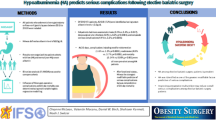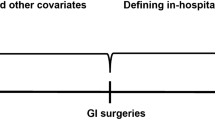Abstract
Background
The incidence and impact of hypoalbuminemia in bariatric surgery patients is poorly characterized. We describe its distribution in laparoscopic sleeve gastrectomy (VSG) and Roux-en-Y gastric bypass (RYGB) patients undergoing primary or revision surgeries and assess its impact on postoperative complications.
Methods
The Metabolic and Bariatric Surgery Quality Improvement Program Database (2015 to 2021) was analyzed. Hypoalbuminemia was defined as Severe (< 3 g/dL), Moderate (3 ≤ 3.5 g/dL), Mild (3.5 ≤ 4 g/dL), or Normal (≥ 4 g/dL). Multivariable logistic regression was performed to calculate odds ratios of postoperative complications compared to those with Normal albumin after controlling for procedure, age, gender, race, body mass index, functional status, American Society of Anesthesia class, and operative length.
Results
A total of 817,310 patients undergoing Primary surgery and 69,938 patients undergoing Revision/Conversion (“Revision”) surgery were analyzed. The prevalence of hypoalbuminemia was as follows (Primary, Revision): Severe, 0.3%, 0.6%; Moderate, 5.2%, 6.5%; Mild, 28.3%, 31.4%; Normal, 66.2%, 61.4%. Primary and Revision patients with hypoalbuminemia had a significantly higher prevalence (p < 0.01) of several co-morbidities, including hypertension and insulin-dependent diabetes. Any degree of hypoalbuminemia increased the odds ratio of several complications in Primary and Revision patients, including readmission, intervention, and reoperation. In Primary patients, all levels of hypoalbuminemia also increased the odds ratio of unplanned intubation, intensive care unit admission, and venous thromboembolism requiring therapy.
Conclusion
Over 30% of patients present with hypoalbuminemia. Even mild hypoalbuminemia was associated with an increased rate of several complications including readmission, intervention, and reoperation. Ensuring nutritional optimization, especially prior to revision surgery, may improve outcomes in this challenging population.
Graphical Abstract



Similar content being viewed by others
Data Availability
It is already mentioned that this data is publically available via the MBSAQIP.
References
Courcoulas AP, Yanovski SZ, Bond D, et al. Long-term outcomes of bariatric surgery: a National Institutes of Health symposium. JAMA Surg. 2014;149(12):1323–9.
Crémieux PY, Ledoux S, Clerici C, et al. The impact of bariatric surgery on comorbidities and medication use among obese patients. Obes Surg. 2010;20(7):861–70.
Aminian A, Wilson R, Al-Kurd A, et al. Association of bariatric surgery with cancer risk and mortality in adults with obesity. JAMA. 2022;327(24):2423–33.
American Society of Metabolic and Bariatric Surgery, Estimate of Bariatric Surgery Numbers, 2011–2020. 2022.
Roust LR, DiBaise JK. Nutrient deficiencies prior to bariatric surgery. Curr Opin Clin Nutr Metab Care. 2017;20(2):138–44.
Aron-Wisnewsky J, Verger EO, Bounaix C, et al. Nutritional and protein deficiencies in the short term following both gastric bypass and gastric banding. PLoS ONE. 2016;11(2): e0149588.
Xu J, Zheng B, Zhang S, et al. Effects of preoperative sarcopenia on postoperative complications of minimally invasive oesophagectomy for oesophageal squamous cell carcinoma. J Thorac Dis. 2019;11(6):2535–45.
Tamura T, Sakurai K, Nambara M, et al. Adverse effects of preoperative sarcopenia on postoperative complications of patients with gastric cancer. Anticancer Res. 2019;39(2):987.
Chen F, Chi J, Liu Y, et al. Impact of preoperative sarcopenia on postoperative complications and prognosis of gastric cancer resection: a meta-analysis of cohort studies. Arch Gerontol Geriatr. 2022;98: 104534.
Stenholm S, Harris TB, Rantanen T, et al. Sarcopenic obesity: definition, cause and consequences. Curr Opin Clin Nutr Metab Care. 2008;11(6):693–700.
Cruz-Jentoft AJ, Bahat G, Bauer J, et al. Sarcopenia: revised European consensus on definition and diagnosis. Age Ageing. 2019;48(1):16–31.
Ryu Y, Shin SH, Kim J-H, et al. The effects of sarcopenia and sarcopenic obesity after pancreaticoduodenectomy in patients with pancreatic head cancer. HPB. 2020;22(12):1782–92.
Zhang W-T, Lin J, Chen W-s, et al. Sarcopenic obesity is associated with severe postoperative complications in gastric cancer patients undergoing gastrectomy: a prospective study. J Gastrointest Surg. 2018;22(11):1861–9.
Baumgartner RN, Koehler KM, Romero L, et al. Serum albumin is associated with skeletal muscle in elderly men and women. Am J Clin Nutr. 1996;64(4):552–8.
Health, A. and B.C. Study. Lower serum albumin concentration and change in muscle mass: the health, aging and body composition study. Am J Clin Nutr. 2005;82(3):531–7.
van Atteveld VA, Van Ancum JM, Reijnierse EM, et al. Erythrocyte sedimentation rate and albumin as markers of inflammation are associated with measures of sarcopenia: a cross-sectional study. BMC Geriatr. 2019;19(1):233.
Schalk BWM, Deeg DJH, Penninx BWJH, et al. Serum albumin and muscle strength: a longitudinal study in older men and women. J Am Geriatr Soc. 2005;53(8):1331–8.
Reijnierse EM, Trappenburg MC, Leter MJ, et al. Serum albumin and muscle measures in a cohort of healthy young and old participants. Age. 2015;37(5):88.
McLean C, Mocanu V, Birch DW, et al. Hypoalbuminemia predicts serious complications following elective bariatric surgery. Obes Surg. 2021;31(10):4519–27.
Perez SC, Alessi IG, Wheeler AA. Hypoalbuminemia as a risk factor for complications in revisional/conversional bariatric surgery: an MBSAQIP analysis. Surg Obes Relat Dis. 2023;9(6):555–61. https://doi.org/10.1016/j.soard.2022.12.010.
Breyer I, Astor BC, Srivastava A, et al. Pre-transplant hypoalbuminemia is not associated with worse short-term outcomes among kidney transplant recipients. Clin Transplant. 2023;37(2): e14862.
Rudasill SE, Morales RR, Sanaiha Y, et al. Predicting morbidity and mortality in laparoscopic cholecystectomy: preoperative serum albumin still matters. Am J Surg. 2020;220(2):432–7.
Christina NM, Tjahyanto T, Lie JG, Santoso TA, Albertus H, Octavianus D, Putri DAUI, Andrew J, Jatinugroho YD, Shiady C, Wijaya JH. Hypoalbuminemia and colorectal cancer patients: Any correlation?: A systematic review and meta-analysis. Medicine (Baltimore). 2023;102(8):e32938. https://doi.org/10.1097/MD.0000000000032938.
Mabeza RM, Chervu N, Hadaya J, et al. Impact of malnutrition on outcomes following groin hernia repair: insights from the ACS NSQIP. Surgery. 2022;172(5):1456–62.
Soeters PB, Wolfe RR, Shenkin A. Hypoalbuminemia: pathogenesis and clinical significance. JPEN J Parenter Enteral Nutr. 2019;43(2):181–93.
McCutchen AS, Munoz JC, Brenner L, et al. Lower albumin levels in African Americans at colon cancer diagnosis: a potential explanation for outcome disparities between groups? Int J Colorectal Dis. 2011;26(4):469–72.
Montgomery SR, Butler PD, Wirtalla CJ, et al. Racial disparities in surgical outcomes of patients with inflammatory bowel disease. Am J Surg. 2018;215(6):1046–50.
Riner AN, Girma S, Vudatha V, et al. Eligibility criteria perpetuate disparities in enrollment and participation of black patients in pancreatic cancer clinical trials. J Clin Oncol. 2022;40(20):2193–202.
Gordon-Larsen P, Popkin B. Understanding socioeconomic and racial/ethnic status disparities in diet, exercise, and weight: underlying contextual factors and pathways. J Am Diet Assoc. 2011;111(12):1816–9.
Carter J, Chang J, Birriel TJ, et al. ASMBS position statement on preoperative patient optimization before metabolic and bariatric surgery. Surg Obes Relat Dis. 2021;17(12):1956–76.
Durrand J, Singh SJ, Danjoux G. Prehabilitation. Clin Med (Lond). 2019;19(6):458–64.
Hughes MJ, Hackney RJ, Lamb PJ, et al. Prehabilitation before major abdominal surgery: a systematic review and meta-analysis. World J Surg. 2019;43(7):1661–8.
Gilbertson NM, Gaitán JM, Osinski V, et al. Pre-operative aerobic exercise on metabolic health and surgical outcomes in patients receiving bariatric surgery: a pilot trial. PLoS ONE. 2020;15(10): e0239130.
Marc-Hernández A, Ruiz-Tovar J, Aracil A, et al. Impact of exercise on body composition and cardiometabolic risk factors in patients awaiting bariatric surgery. Obes Surg. 2019;29(12):3891–900.
Durey BJ, Fritche D, Martin DS, et al. The effect of pre-operative exercise intervention on patient outcomes following bariatric surgery: a systematic review and meta-analysis. Obes Surg. 2022;32(1):160–9.
Anderson FA, Spencer FA. Risk factors for venous thromboembolism. Circulation. 2003;107(23_suppl_1):I-9–I−16.
Alvarez MP, Samayoa-Mendez AX, Naglak MC, et al. Risk factors for postoperative unplanned intubation: analysis of a national database. Am Surg. 2015;81(8):820–5.
Perry R, Herbert G, Atkinson C, England C, Northstone K, Baos S, Brush T, Chong A, Ness A, Harris J, Haase A, Shah S, Pufulete M. Pre-admission interventions (prehabilitation) to improve outcome after major elective surgery: a systematic review and meta-analysis. BMJ Open. 2021;11(9):e050806. https://doi.org/10.1136/bmjopen-2021-050806.
Hennessey DB, Burke JP, Ni-Dhonochu T, et al. Preoperative hypoalbuminemia is an independent risk factor for the development of surgical site infection following gastrointestinal surgery: a multi-institutional study. Ann Surg. 2010;252(2).
di Masi A, Leboffe L, Polticelli F, Tonon F, Zennaro C, Caterino M, Stano P, Fischer S, Hägele M, Müller M, Kleger A, Papatheodorou P, Nocca G, Arcovito A, Gori A, Ruoppolo M, Barth H, Petrosillo N, Ascenzi P, Di Bella S. Human serum albumin is an essential component of the host defense mechanism against clostridium difficile intoxication. J Infect Dis. 2018;218(9):1424–35. https://doi.org/10.1093/infdis/jiy338.
Tabak YP, Johannes RS, Sun X, et al. Predicting the risk for hospital-onset Clostridium difficile infection (HO-CDI) at the time of inpatient admission: HO-CDI risk score. Infect Control Hosp Epidemiol. 2015;36(6):695–701.
Probst P, Ohmann S, Klaiber U, et al. Meta-analysis of immunonutrition in major abdominal surgery. Br J Surg. 2017;104(12):1594–608.
Mohapatra S, Gangadharan K, Pitchumoni CS. Malnutrition in obesity before and after bariatric surgery. Dis Mon. 2020;66(2): 100866.
Faintuch J, Matsuda M, Cruz MELF, et al. Severe protein-calorie malnutrition after bariatric procedures. Obes Surg. 2004;14(2):175–81.
Author information
Authors and Affiliations
Corresponding author
Ethics declarations
Ethical Approval
For this type of study, formal consent is not required.
Conflict of Interest
The authors declare no competing interests.
Additional information
Publisher's Note
Springer Nature remains neutral with regard to jurisdictional claims in published maps and institutional affiliations.
Key Points
• Over 30% of VSG and RYGB patients have preoperative hypoalbuminemia.
• Hypoalbuminemia is associated with a greater co-morbidity burden.
• Hypoalbuminemia increases risk of readmission and reoperation.
Rights and permissions
Springer Nature or its licensor (e.g. a society or other partner) holds exclusive rights to this article under a publishing agreement with the author(s) or other rightsholder(s); author self-archiving of the accepted manuscript version of this article is solely governed by the terms of such publishing agreement and applicable law.
About this article
Cite this article
Ying, L.D., Chao, G.F., Canner, J. et al. The Degree of Preoperative Hypoalbuminemia Is Associated with Risk of Postoperative Complications in Metabolic and Bariatric Surgery Patients. OBES SURG 34, 51–70 (2024). https://doi.org/10.1007/s11695-023-06944-1
Received:
Revised:
Accepted:
Published:
Issue Date:
DOI: https://doi.org/10.1007/s11695-023-06944-1




